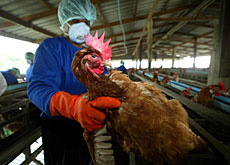Swiss ban Thai and Chinese poultry imports

Switzerland has banned imports of poultry and poultry products from Thailand and China following a bird flu outbreak.
The measure is aimed at keeping Switzerland free of the deadly virus, which has spread to humans in several southeast Asian countries.
Friday’s decision by the Federal Veterinary Office came just hours after the Bangkok authorities confirmed two cases of avian flu in humans.
Swiss officials stressed that the disease could not be transmitted through eating meat – only through contact with infected birds.
“The consumption of chicken meat is not dangerous for people. Our ban is only to protect the birds here in Switzerland,” says Marcel Falk, spokesman for the Federal Veterinary Office.
“We also imposed a ban on imports from China because there are already rumours that bird flu exists there as well,” he added.
Highly contagious
Bird flu – a highly contagious poultry disease that can be transmitted to humans – has forced a number of Asian countries to destroy millions of chickens in the past few weeks.
After days of denials, Thailand confirmed an outbreak of bird flu on Friday, prompting the European Union to ban imports of poultry from the country.
The authorities in Bangkok reported that two boys had contracted the virus by touching infected birds.
Switzerland’s two largest retailers, Migros and Coop, told swissinfo that they would not be affected by the ban, as they did not import poultry from Asian countries.
But Karl Weisskopf, a spokesman for Coop, said the company was testing a number of ready-made foods for the disease.
“At the moment we are running a series of tests in our laboratories to find out if the chicken in pre-packaged foods, such as Bami Goreng, is contaminated by bird flu,” he said.
Last year Switzerland imported 5,000 tons of poultry from Thailand and 500 tons from China.
Human transmission
Prior to Friday only Vietnam – where at least five people have died from the disease – had reported cases of bird flu jumping to humans.
Cambodia has also reported a bird flu outbreak, bringing to six the number of Asian countries hit by the disease, according to a spokesman for the United Nations Food Agency.
Taiwan, Japan, South Korea and Vietnam have also confirmed bird flu outbreaks.
The Geneva-based World Health Organization (WHO) said the situation was of “serious concern to human health”.
Officials have expressed concern that the avian virus could mutate to allow human transmission, which could make the disease a bigger health crisis than Sars.
Like bird flu, the Sars virus – which killed nearly 800 people last year – also crossed from animals to humans.
“Our greatest concern is that it could combine with human influenza virus and become more readily spread from person to person,” Dick Thompson, WHO spokesman, told swissinfo.
The WHO says bird flu will not be easy to stamp out as the virus has mutated since previous outbreaks in Hong Kong in 1997 and 2003.
swissinfo, Karin Kamp
Influenza occurs in pigs, horses, birds and several other mammals.
Bird flu first jumped from one species to another in Hong Kong in 1997.
Humans who have contracted the disease show symptoms of fever, sore throat and cough.
The WHO says a new, powerful strain of flu could sweep around the world if a person got human and bird flu at the same time.
This could form a new strain of flu that could easily pass from one human to another.
The last case of bird flu in Switzerland was in 1930.

In compliance with the JTI standards
More: SWI swissinfo.ch certified by the Journalism Trust Initiative

You can find an overview of ongoing debates with our journalists here . Please join us!
If you want to start a conversation about a topic raised in this article or want to report factual errors, email us at english@swissinfo.ch.